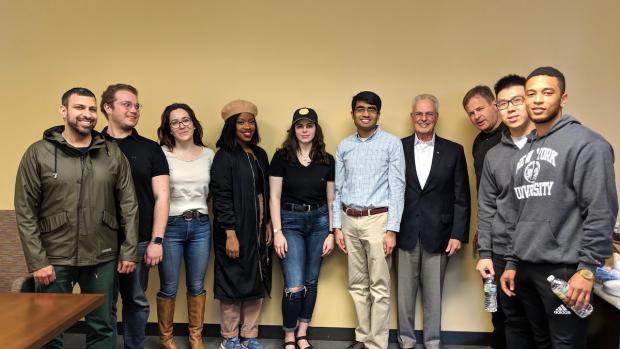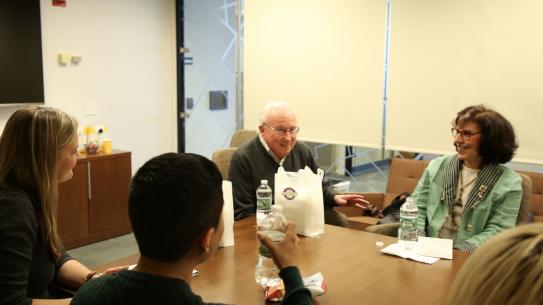Aspiring engineers envision their future careers with the help of notable alumni

Fourth from right, Alum Nick Trentacoste with students
This semester, Tandon’s Office of Development and Alumni Relations, under the direction of Associate Dean Steve Sagner, continued its longstanding tradition of inviting accomplished former grads back to the school to share their experiences and give advice to select groups of students, who had been chosen for the honor on the basis of their academic performance, service to the school, and recommendation of their professors. Over the course of the semester, students got to hear what Tandon was like in decades past (with more than one alum mentioning that there were far fewer women and certainly no 3D printers), how to best leverage their engineering educations in the work world, and which ideals they should keep in mind as they go through life.
The speakers included CEOs, inventors, and engineers of every stripe, but on the day they visited Tandon, each was, first and foremost, a mentor and role model.
Ray Zambuto (’67, ’70)
Memories: Initially, Zambuto was on what he jokingly refers to as the “other dean’s list,” comprised of students whose grades were exceedingly poor.
Career: Zambuto is the founder of Massachusetts-based Technology in Medicine, which has grown since its launch in 1974 into one of the most respected names in healthcare technology management. He has been elected a fellow of the American Institute for Medical and Biological Engineering's (AIMBE), one of the highest honors, in the biomedical engineering discipline, and is a past president of the American College of Clinical Engineering.
Advice: Don’t operate in a vacuum; you need to engage in an interplay of ideas if you’re going to innovate. Remember the concept of service; if you take care of your clients and employees, the money will take care of itself.
Jeff Lee (’91)
Memories: During my college years, I ultimately earned four degrees: a bachelor’s in computer science from the NYU College of Arts & Science, a bachelor’s in electrical engineering from Cooper Union, a master’s in electrical engineering from Tandon, and an MBA from NYU Stern. I loved school, but looking back, that might not have been strictly necessary for a successful career.
Career: Now a partner at Middlemark, a financial services firm that helps alternative asset managers and institutional investors achieve their goals, Lee had previously co-founded a STEAM enrichment program that grew to more than a dozen locations and served as Head of Alternative Investments at Nikko Asset Management, where he established a hedge fund of funds and external manager business that grew to over $30 billion in just eight years. (He has been celebrated for his ability to help clients avoid several significant hedge fund blow-ups, including Bernard Madoff, potentially saving investors more than $4 billion.)
Advice: No one is going to hire you simply because you took Portfolio Management 101 or 1001; you have to prove that you can do the work.
Nick Trentacoste (’63, ’65, ’69)
Memories: It was a difficult time for the school to find funding, and we got bounced around some, but that was okay. I lived over near Ebbets Field, an iconic Major League Baseball stadium in the Flatbush section of the borough, so that was interesting.
Career: Early in his career, Trentacoste worked for Bell Aerospace and General Applied Science Laboratories, focusing on hypersonic flight and supersonic combustion technologies and helping develop space shuttle engine prototypes and stealth aircraft propulsion technologies. He joined SAIC (now Leidos) in 1971 as a senior scientist and rose to Senior VP for Corporate Development as the company grew from $10 million to $5 billion in revenue per year. Following other stints in industry and as an independent consultant, he founded Spartan Remediation & Energy Solutions, which is commercializing a technology that converts organic wastes and toxins into benign energy products.
Advice: Make a vow to yourself that you’ll never stop learning, be careful to avoid internal company bickering, and you’ll do just fine wherever you land.

Bill Hery (’67, ’71, ’74) and Mary J. Calabro (’74, ’77)
Memories: Calabro remembers a time when getting to her classroom at Rogers Hall meant being the sole woman in an elevator packed with men — and she remembers when one particular man caught her eye: Hery, then a long-haired math major who shared her love of card games and skiing. (The couple married in 1977.)
Careers: After teaching for a time, both embarked on jobs in industry: Hery as a researcher at Bell Labs, and Calabro as a computing and information manager at ExxonMobil. (She was the first married woman at the company to accept an out-of-state post “unaccompanied,” since Hery was tied to his own job at that point and could not relocate with her.) Upon his retirement from Bell Labs, Hery returned to what he still often thinks of as Brooklyn Poly to co-direct the Information Systems and Internet Security lab and teach courses on Information Security and other, related topics.
Advice: There may always be some push and pull when you’re a dual-career couple, and when one gets a good offer, the other will have to assess his or her own next move, but it’s doable. You have to weigh what you’re passionate about and what seems practical.
Frank Cevasco ('63)
Memories: In 1963 the School spent what was then the largest amount in its history ($93,000) to purchase 10,000 new books and periodicals for its library – too late for Cevasco to fully take advantage of them but a major milestone in Tandon history.
Career: Cevasco earned a Bronze Star for his military service in Vietnam and later embarked on a long career in the Federal Government's Senior Executive Service, where he worked for the Secretary of Defense, overseeing all Pentagon defense system international cooperative development and production programs. Following his government service, he launched an eponymous consulting firm that advised the Pentagon and defense corporations about acquisition programs; evaluated weapon systems; undertook surveys of U.S. and foreign government officials and industry executives; and advised other corporations about trends in the defense industry.
Advice: As engineers, you’re learning how to think analytically and problem solve; those skills will be valuable whatever path you ultimately decide to follow.




